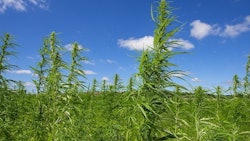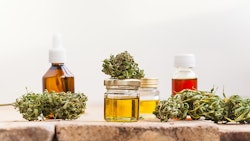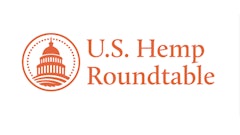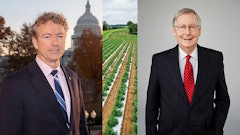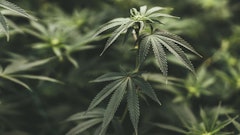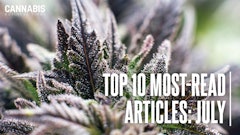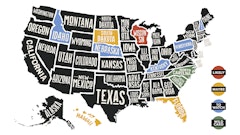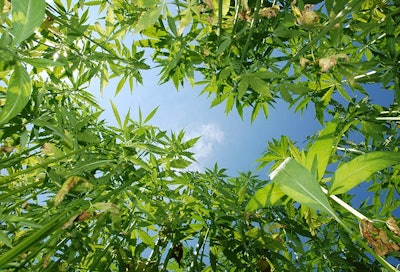
During a speech on Capitol Hill, Senate Majority Leader Mitch McConnell introduced a bill to formally legalize the cultivation and sale of industrial hemp. U.S. Sens. Ron Wyden and Jeff Merkley, of Oregon, joined as co-sponsors.
The Hemp Farming Act of 2018 would put cultivation oversight in the hands of states, building on a recent trend of allowing domestic research on the plant. This bill would remove all financial and legal burdens, giving domestic producers a shot at selling products across state lines, purchasing crop insurance policies and applying for grant funding through the U.S. Department of Agriculture (USDA).
The roots of the Hemp Farming Act language stretch across the last four years of domestic hemp policy.
The Agricultural Act of 2014 (“the Farm Bill”) allowed states to develop industrial hemp research programs as a way of kickstarting the market and developing a library of study on the plant. Kentucky farmers ran with the idea, as McConnell duly pointed out, growing more than 12,800 acres across more than 200 farms in 2017. Only Colorado has produced more industrial hemp in the U.S.
McConnell said his state is contributing to an estimated $600-million domestic hemp market, which only recently has seen this legal participation from U.S. producers.
“But due to current laws, much of this hemp has to be imported,” the Senate Majority Leader said during his April 12 speech. “That cuts out our American farmers. It’s time for that to change.”
It's time the federal gov changes the way it looks at #hemp, which is why Senator @RonWyden and I, along with @SenJeffMerkley, are introducing legislation that will modernize federal law in this area & empower American farmers to explore this promising new market.
— Leader McConnell (@SenateMajLdr) April 12, 2018
Wyden echoed the sentiment, calling current hemp policy "anti-farmer, certainly anti-consumer and anti-common sense."
ProjectCBD explains how hemp cultivation has existed in the U.S. since that 2014 bill: “Whereas previously only products made from hemp grown abroad could be marketed in the United States, for the first time in many years American farmers were allowed to cultivate industrial hemp on domestic soil, albeit on a provisional basis. But only states that legalized industrial hemp farming could opt into this federally sanctioned agricultural experiment. Growing industrial hemp outside the parameters of state-sanctioned pilot research is still forbidden under federal law.”
Kentucky has come out swinging in this state-sanctioned hemp cultivation industry, and McConnell, who’s introduced similar legislation in the past, has made sure to let the country know. Farmers in his state are certainly vocal, as well.
“All my life, all I ever heard was, ‘Stay away from the devil’s lettuce—be a good boy,” Chad Wilson, owner of Green Remedy, told CityLab last year. (Green Remedy produces CBD-infused products.) “But now, with this plant, we have the ability to lift our state out of poverty. And we shouldn’t be battling our government to bring an industry to life on a plant that has no psychoactive effect.”
McConnell insisted in his speech that it’s vital for government regulations to distinguish between hemp and its “illicit cousin,” presumably referring to marijuana. He did not mention CBD extraction in his comments on the Senate floor, but the bill appears to address the matter by defining hemp as the whole plant: “The term ‘hemp’ means the plant Cannabis sativa L. and any part of that plant, including the seeds thereof and all derivatives, extracts, cannabinoids, isomers, acids, salts and salts of isomers, whether growing or not, with a delta-9 tetrahydrocannabinol concentration of not more than 0.3 percent on a dry weight basis.”
In 1970, President Richard Nixon classified both marijuana and hemp as Schedule-I drugs. The 2014 Farm Bill changed that and drew a formal distinction between hemp and marijuana at the 0.3-percent threshold of THC content. The 2018 language regarding "any part of that plant, including the seeds thereof and all derivatives, extracts, cannabinoids..." intends to clear up any gray area left behind by past policy.
Following a March 26 press conference, during which McConnell announced his intent to introduce this bill, Cannabis Business Times spoke with Adriane Polyniak, co-owner of Kentucky Cannabis Company (a member of the Kentucky Industrial Hemp Research Pilot Program) and the consumer-facing Bluegrass Hemp Oil. She expressed concern about how McConnell positioned the bill in the publicity-garnering press conference.
“There’s some definite excitement around some in the industry,” she said of the bill. “I would say that our business—personally—we were a little less than excited about the announcement. He’s talking about industrial hemp and the definition of it being around that 0.3-percent THC, which is an arbitrary number. ... With such confusion in the marketplace when it comes to CBD and CBD products, I think it was a big miss for him not to address it [in the announcement]. Definitions are important. When you’re talking help and trying to continue educating the public on the benefits of CBD and hemp-derived products, it was a miss to not include cannabidiol within that.”
Simultaneously, to combat the legal confusion over hemp and marijuana, the Hemp Industry Association is going after the Drug Enforcement Administration in court. The DEA, the lawsuit argues, has insisted on not differentiating between hemp extracts and marijuana. Federally, CBD oil derived from the hemp plant remains a Schedule-I substance. (Many states, including Kentucky, have instituted a medical marijuana program that specifically allows CBD products.)
Ignoring federal conversations, states continue to implement hemp programs. In early April, Iowa legislators advanced a bill to develop a cultivation research program, joining 33 other states.
McConnell underscored the states’ rights argument embedded throughout the cannabis legalization conversation, saying that this bill will “get the federal government out of the way of this promising market.”
Ed. note: This story has been updated to reflect the text of S. 2667.
Top photo courtesy of Adobe Stock









